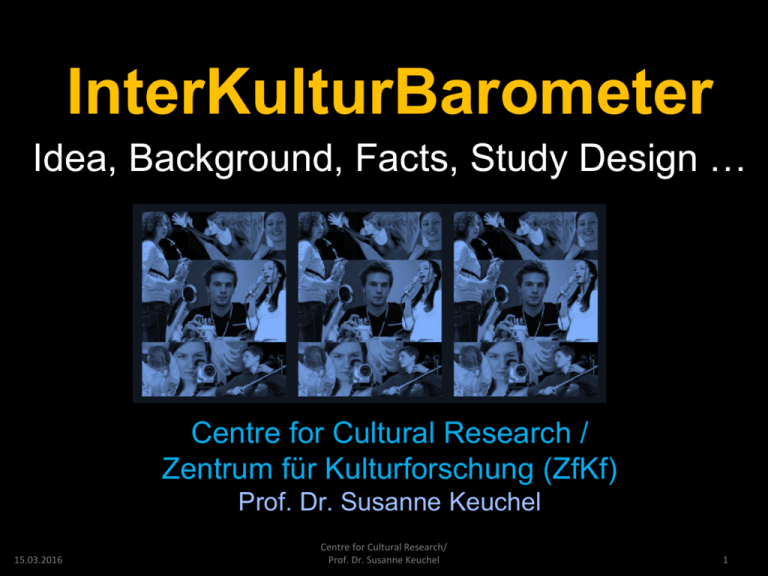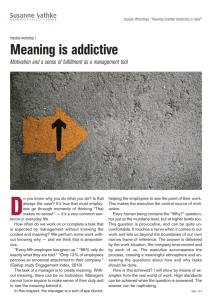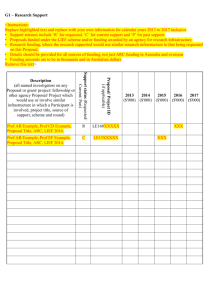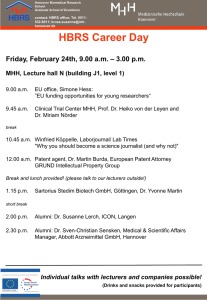InterKulturBarometer
advertisement

InterKulturBarometer Idea, Background, Facts, Study Design … Centre for Cultural Research / Zentrum für Kulturforschung (ZfKf) Prof. Dr. Susanne Keuchel 15.03.2016 Centre for Cultural Research/ Prof. Dr. Susanne Keuchel 1 The ‚KulturBarometer-Series‘ and its Background 15.03.2016 Centre for Cultural Research/ Prof. Dr. Susanne Keuchel 2 KULTURBAROMETER is a nation-wide, representative German survey of ZfKf addressing different cultural themes and sectors 1973 First survey on the status of the artists and public participation in the arts 1975-1990 Other sporadic surveys 1991 With the 1. “KulturBarometer”, a new series is established (first focus on East-West comparisons) … 2011 15.03.2016 9. KulturBarometer Centre for Cultural Research/ Prof. Dr. Susanne Keuchel 3 Example from the KulturBarometer-Series Annual concert visits in time comparison 100% Concerts visited at least once a year 90% 80% 1984/85 1989/90 1993/94 2004/05 70% 60% 50% 40% 30% 20% 10% 0% Music theatre / Opera 15.03.2016 Classical music concert Centre for Cultural Research/ Prof. Dr. Susanne Keuchel Jazz/Rock/Pop concert Folk music / 'Schlager' concert 4 ‚KulturBarometer‘-Special Surveys and their Background 15.03.2016 Centre for Cultural Research/ Prof. Dr. Susanne Keuchel 5 KULTURBAROMETER-SPECIAL SURVEYS are: German representative surveys covering different target groups (cultural interest, activities, attitudes, ‘cultural biographies’ etc.) 2004 1. Youth Culture Barometer Target group: Young people in the age of >14 to <25 years 2006 Culture Barometer 50+ Target group: People in the age of 50 and older 2010/11 2. Youth Culture Barometer Target group: Young people in the age of 14 to 24 years 2011 Intercultural Barometer Target group: Population with and without migration background (14 years and older) 15.03.2016 Centre for Cultural Research/ Prof. Dr. Susanne Keuchel 6 What makes empirical research on „Migration, arts and cultural participation“ interesting? – Observations from previous surveys of the KulturBarometer-Series … 15.03.2016 Centre for Cultural Research/ Prof. Dr. Susanne Keuchel 7 Personal Definition of „Culture“ Differentiated by population groups Theatre Music Cultural heritage / Sights Fine arts Music theatre / Opera Total German population Education / Character 1. Jugend-Kultur-Barometer (Age 14-24) Literature Of which: With migration background Free time activities KulturBarometer 50+ and older Film Traditions and celebrations Culture of Nations Mentality / Lifestyle Dance Science Other 0% 15.03.2016 5% 10% 15% 20% 25% Centre for Cultural Research/ Prof. Dr. Susanne Keuchel 30% 35% 40% 45% 50% 8 People with Migration Background In Germany 2007, differentiated by age groups German background immigrant background 100% 91% 90% 82% 80% 70% 66% 70% 72% 76% 77% 84% 93% 85% 74% 60% 50% 40% 34% 30% 30% 28% 24% 23% 26% 18% 20% 16% 15% 9% 10% 7% 0% 0-5 5-10 10-15 15-20 20-25 25-35 35-45 45-55 55-65 65-75 75 and older Data from the German Federal Statistical Office. 15.03.2016 Centre for Cultural Research/ Prof. Dr. Susanne Keuchel 9 First reason / hypothesis: The cultural conception in the young generation in Germany is changing because of migration. Quotations from qualitative interviews to this aspect [Pilot study to the InterkulturBarometer] „Of course, cultures are connected to states and region. In the origin of differences, religion plays a important role just as the economic development and the history of a country.“ (Turkish Artist) „Children with migrant background are not treated correct in school. The question: Where do you come from?‘ is bad. In the United States you never would ask this question.“ (Syrian Kurd, Student) 15.03.2016 Center of Cultural Research/ Prof. Dr. Susanne Keuchel 10 Artistic activities in leisure time of the 14 to 24-year-old, differentiated by their parent‘s country of origin 60% 50% Both parents are German One parent is German 40% Both parents are from other countries 30% 20% 10% 0% Has been involved in an art activity (of any kind) 15.03.2016 Is currently engaged in an artistic traditional hobby Centre for Cultural Research/ Prof. Dr. Susanne Keuchel Has attended an artistic program of an instiution (e.g. music school) 11 Second reason / hypothesis: Artistic activities and expressions help to work up migrant experience. Quotations from qualitative interviews to this aspect [Pilot study to the InterkulturBarometer] "Migration can encourage creativity, because you have a double past. I feed myself with culture of different countries and that‘s a profit for my artistic signature.“ (Turkish Painter) "Migration benefits a cultural experience and because of this it‘s a gain for the artistic work. It [migration] is a kick and a challenge. The bigger the cultural difference between two countries, the more valuable it is in this regard." (Russian Musician) 15.03.2016 Centre for Cultural Research/ Prof. Dr. Susanne Keuchel 12 Country of origin of artists and art works Cultural offer in the city of Cologne, four months in 2009/10 (n = 4.839) (Multiple response Germany 63% 54% 11% Anglo-american area France 2% 3% Scandinavia 3% 3% 14% 1% 2% Italy Asia 0 Latin America 0 2% Countries of origin of artists 1% Russia / Soviet Union 1% 1% Turkey 1% 1% Africa 1% 1% Poland 1% 0% Countries of origin of art works 4% 5% Rest of Europe 1% 1% Rest of eastern Europa Other countries 2% 5% 15% 17% Not specified 0% 10% 20% 30% 40% 50% 60% 70% 31% of the Cologne population has a migration background; 36% of all foreigners in Cologne come from Turkey. 13 15.03.2016 Centre for Cultural Research/ Prof. Dr. Susanne Keuchel Cultural offers of the Cologne migrant associations Differentiated by art forms and country of origin (Multiple response) Traditional art from countries of origin of members 81% Classical art from Europe 35% Contemporary art from Europe 23% Contemporary art from countries of origin of members 19% Popular art from Europe and the anglo-american area 19% Traditional art from Germany 18% Popular art from countries of origin of members 18% Classical art from countries of origin of members 12% Not specified 5% 0% 10% 20% 30% 40% 50% 60% 70% 80% 90% 14 15.03.2016 Centre for Cultural Research/ Prof. Dr. Susanne Keuchel Third reason / hypothesis: Migration can build up cultural “parallel societies”. Quotation from qualitative interviews to this aspect [Pilot study to the InterkulturBarometer] „In Russia we were always Germans. Here we are always Russians.“ (Russian-German customs employee) 15.03.2016 Centre for Cultural Research/ Prof. Dr. Susanne Keuchel 15 Interest in Different Exhibition Themes Comparison of younger and older people in Germany Ethnology art Antique arts / Archeology Contemporary history (Cultural) History exhibitions Medieval art / Renaissance art Baroque art / Romantic art Photography Contemporary art Age 50 and older Age 14-24 Applied arts Impressionism / Expressionism Architecture / Design Science / Natural history exhibitions Modern sculptures Media / Video art 0% 15.03.2016 5% 10% Centre for Cultural Research/ Prof. Dr. Susanne Keuchel 15% 20% 25% 30% 16 Refusal of „Foreign" Arts In relation to school education and cultural participation of 14 to 24-year-olds “I don’t like foreign arts at all” (Reason for a lack of contact with the arts of different cultures) 100% 80% chi2 = 12,2 60% chi2 = 19,0 strong interest in cultural offers low or no interest in cultural offers chi2 = 14,`3 40% 20% 0% low medium high school education level... 15.03.2016 Centre for Cultural Research/ Prof. Dr. Susanne Keuchel 17 Relationship to culture of countries Of the qualitative interviewpartners in the pilot study (InterKulturBarometer) Artists of immigrant background (n=5) Artists of German background (n=2) Non-Artists of immigrant background (n=3) Country of Origin Germany Europe Other Countries No country in particular +++ ++ ++ + + + + + ++ + Non-Artists of German background (n=2) + + Migrants, especially artists, are able to identify themselves with several national and regional cultures. 15.03.2016 Centre for Cultural Research/ Prof. Dr. Susanne Keuchel 18 Fourth reason / hypothesis: The arts provide opportunities to build "bridges" between people of different origin/cultural background Quotation from qualitative interviews to this aspect [Pilot study to the InterkulturBarometer] „Art can definitely be a bridge. I mustn‘t speak with other musicians, it‘s enough, if we all make music. Then music is the language.“ (Iranian female Singer) 15.03.2016 Centre for Cultural Research/ Prof. Dr. Susanne Keuchel 19 About the Study Design of the InterKulturBarometer 15.03.2016 Centre for Cultural Research/ Prof. Dr. Susanne Keuchel 20 Main Topics of the InterKulturBarometer 1) ‘Cultural Participation‘ in the population with and without migrant background: Is there a difference? 2) What opportunities for the arts to build "bridges" between people with different origin or cultural background? 3) What are the prospects for a ‚transcultural‘ society? What forms of new artistic expressions are developing? 15.03.2016 Centre for Cultural Research/ Prof. Dr. Susanne Keuchel 21 Module 1 Germany-wide Representative Sample Module 2 Regional Qualitative Interviews (n = 2.500) „Stratified Sample": In two regions (Länder) Nationwide representative survey plus representative survey of migrant population (optional) Taking different regional sites into account (Big cities, towns and rural areas) Start: in October 2011 Start: in June 2011 15.03.2016 Centre for Cultural Research/ Prof. Dr. Susanne Keuchel 22 Vielen Dank für Ihre Aufmerksamkeit „I see no deficit [ … in my migration experience …] but, as an artist, rather a gain; even for the country, in which I live now. The country is more colourful now.“ (Turkish Painter) 15.03.2016 Centre for Cultural Research/ Prof. Dr. Susanne Keuchel 23 Vielen Dank für Ihre Aufmerksamkeit Thank you very much for your attention! 15.03.2016 Centre for Cultural Research/ Prof. Dr. Susanne Keuchel 24






